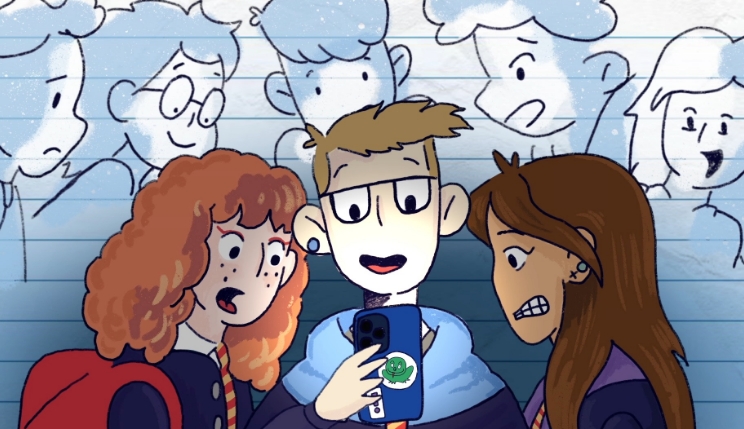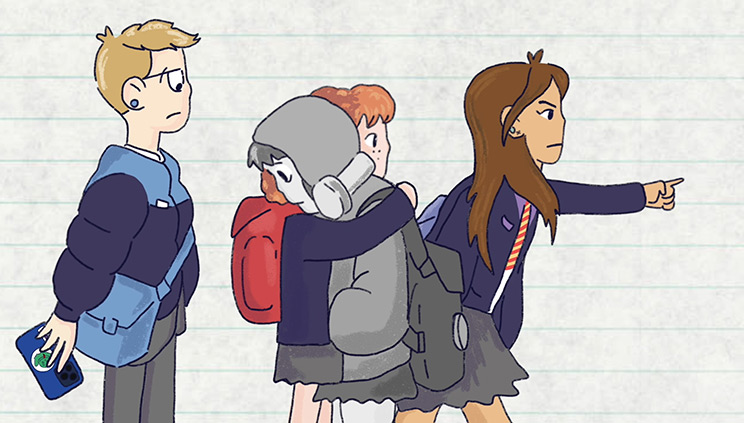VISION research in action
Principal Investigators: Lisa C Davis and Kate Gorman, Changing Relations Community Interest Company (C.I.C)
Summary
This project addressed peer sexual abuse in schools. The creative team collaborated with survivors of peer sexual abuse and school students as well as Park View and Hermitage School staff, the Centre for Research in Violence and Abuse Durham University and the local Rape and Sexual Abuse Counselling Centre (Darlington and County Durham), to co-produce an animation that weaved voices of those with lived experience of abuse, school responses and the wider victim-shaming culture surrounding sexual misconduct and reports of peer sexual abuse. They piloted a lesson, assembly and CPD training based around the animation and host webinar-based screenings and engaged policy makers in discussions in changing school guidance.
Aims
- Support victims to disclose, report or seek help even on ‘low-level’ acts and contribute to improving their mental health, resilience, self-esteem and attendance.
- Support professionals to more effectively engage and support young people to challenge the tendency towards the toxic victim-shaming culture evident in school communities.
Key findings
- Creativity offers a rich collaborative opportunity between young people with lived experience of abuse and trauma and practitioners.
- Co-production is not just about how the young people are involved in a project but also about the creative practitioners’ involvement as well. In this project the creative practitioners supported each other, problem solved and created an exceptional experience for the young people.
- It was vital that the young people involved in the co-production of the animation understood that it was collaborative and could see their, and others’, contributions within the final output.
- Student feedback referenced that the normalisation of harmful attitudes and behaviours might mean they are not paying attention to them.
- Teacher feedback found the animation “thought-provoking” and spoke of the value of hearing the student voice. There was concern that the nuance would not be understood by students watching the animation. Frustration was also expressed at the stereotyping of teachers and in particular a desire expressed for the teacher that the young people approach for help to look more neutral, rather than “cool”. This is aligned with both teacher and student participant reports of the wide range of teachers that students choose to approach for help.
Gallery
Principal Investigator: Rosa Wilson Garwood, Surviving Economic Abuse
Summary
In 2023, SEA piloted a Rapid Impact Survey generating powerful new data about the nature and prevalence of economic abuse. With the funding from VISION and in partnership with University of Warwick and London Metropolitan University, SEA expanded the scope of the survey to understand more about victim-survivors’ experiences of economic abuse and inform their work.
Aims
- Generate new data to support improved measurement of this form of violence and increase understanding of the impact of economic abuse interventions.
- Expose the links between violence, health and society by exploring economic abuse in the context intersecting inequalities.
- Support evidence-led responses to economic abuse.
Key Findings
- 4.1 million UK women experienced economic abuse in the last year.
- Black, Asian and other ethnically minoritised women are 2 x as likely to experience economic abuse than White women.
- Nearly 6 in 10 victim-survivors who had heard of economic abuse reached out for help.
- Nearly 3 in 4 (72%) victim-survivors said the perpetrator’s economic abuse caused them harm.
- Women with children were almost three times as likely to experience economic abuse compared to those without.
Principal Investigator: Maya Flax, University of West London
Summary
This project reviewed the hate crime reporting system focusing on supporting the mental health recovery of victims with multiple minority identities. Available research underscores that these victims often endure disproportionate psychological and, at times, physical harm compared to those affected by ‘non-hate’ crimes. The intersections of multiple identities elevate the health risks faced by these individuals. Unfortunately, the current legislation and hate crime recording system inadequately address the complexities of multiple minority identities (such as LGBTQ and an ethnic minority). To address these deficiencies, this research was completed collaboratively with the National Independent Advisory Group on Hate Crime in the National Police Chief’s Council.
Aims
- Establish an improved hate crime recording system and develop evidence-based policies for the intersectional coding of hate crimes.
- Enhance support for victims, ensuring that diverse motivations for harm are effectively captured and prosecuted.
- Improve mental health of hate crime victims, fostered by a sense of protection through the Criminal Justice System.
Key Findings
- The current legislation and hate crime recording system inadequately address the complexities of multiple minority identities.
- Intersectional minority identities increase feelings of vulnerability. Victims often find themselves defending multiple aspects of their identity simultaneously, which can be mentally exhausting and emotionally taxing.
- Victims with multiple marginalised identities often face compounded difficulties in reporting hate crimes due to a lack of understanding by police officers of their intersecting identities with many victims feeling that their multifaceted identities are overlooked or reduced to a single characteristic.
Principal Investigator: Mirna Guha, Anglia Ruskin University
Summary
Through a collaboration between Anglia Ruskin University, the Institute for Social Justice and Crime at University of Suffolk, Peterborough Women’s Aid and Stonewater Asian Women’s Refuge, this mixed methods research explored the impact of the leadership of Black and Asian women within domestic abuse service provision in a region with a notable absence of ‘by and for’ (BFR) services.
Aims
- Establish causal pathways and connections which demonstrate how the capacity-building of minoritised women affects VAWG services and minoritised service users’ experiences.
- Establish a knowledge and evidence base by integrating information from multiple sources to advocate for the deployment of national, regional and local funding towards leadership of minoritised women within DA service provision in a region with minimal presence of BFR services.
Key Findings
Scoping study findings
A scoping review of the local and regional Domestic Abuse and Sexual Violence (DASV) service provision across the East of England, the identification of emerging leaders and the assessment of leadership skills, challenges and opportunities highlighted the following exclusions experienced by Black and other racialised DASV victim-survivors:
- Additional barriers created by generalist organisational rigidity and‘box-ticking’.
- Historic mistrust in the criminal justice system.
- Concentration of services in urban areas thereby neglecting the rural areas.
Policy and practice recommendations resulting from the study
- Increase funding to ‘by and for’ organisations.
- Recognise and support the leadership of Black and other racialised women in the DASV sector.
- Prioritise simultaneous consideration of locality and race in improving DASV services.
- Provide training to DASV service providers on the needs and challenges faced by victim-survivors attempting to access support.
Principal Investigator: Sarah Wallace, University of South Wales
Summary
A University of South Wales, Calan DVS, and South Wales Police collaboration, this study was the first of a multi-phased stalking research programme in Wales. Phase one explored knowledge, awareness and understanding of stalking among young people (YP) aged 16-24 years in Wales e.g., recognising behaviours, reporting, impacts, and safeguarding. Findings informed the development of framework/guidance, with accompanying materials (road map, short film, and educational/best practice resources) for workforce/organisations/communities to facilitate and enhance knowledge, awareness and understanding amongst YP.
Aims
- Explore knowledge, awareness and understanding of stalking among YP in Wales.
- Inform the development of framework/guidance and materials for YP aged 16-24.
Key Findings
- Limited Evaluation of Existing Programmes: While several UK charities offer stalking education and training, robust and public evaluations are scarce.
- Academic Literature Trends: Most academic studies focus on bystander programmes that may include stalking within broader categories like sexual harassment and relationship violence. This generalisation risks obscuring stalking’s unique dynamics.
- Representation Gaps: Resources and research often fail to reflect the experiences of minority groups. LGBTQ+ youth and ethnic minorities face higher risks, including links to honour-based abuse, yet are underrepresented in studies.
- Need for Co-Production: Effective stalking education should be co-created with young people. Initiatives like games and lesson plans developed collaboratively demonstrate the value of youth involvement but robust evaluation is needed to ensure impact. Young people’s digital habits and lived experiences must inform educational design.
- Welsh Context and Policy: Stalking is a concern for young people in Wales, but it is not explicitly addressed in the Welsh Government’s Relationship and Sexuality Education Code (Welsh Government, 2022). However, its inclusion in the new UK Statutory guidance for Relationships and Sex Education (RSE) and Health Education (Department for Education, 2025) marks progress.


